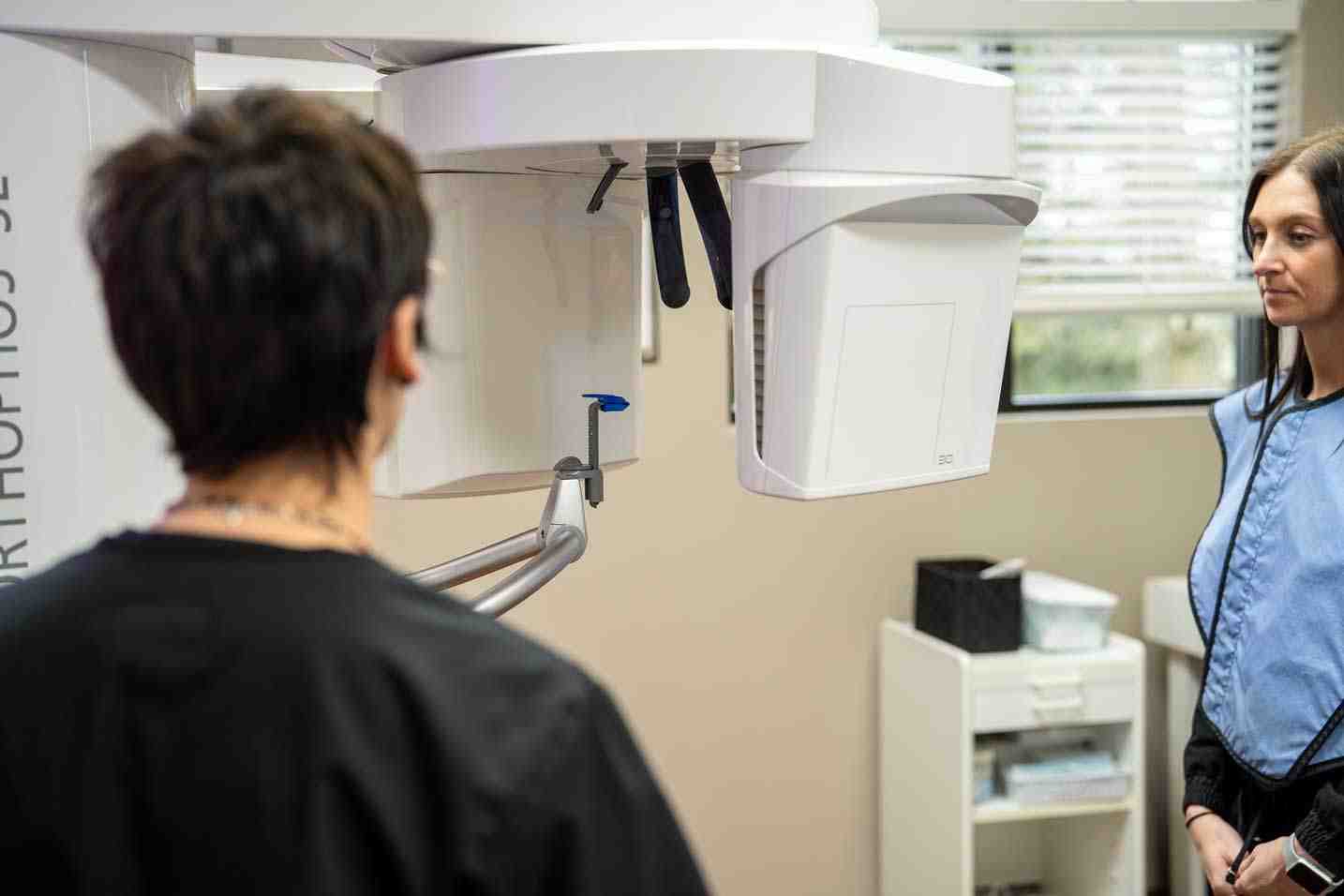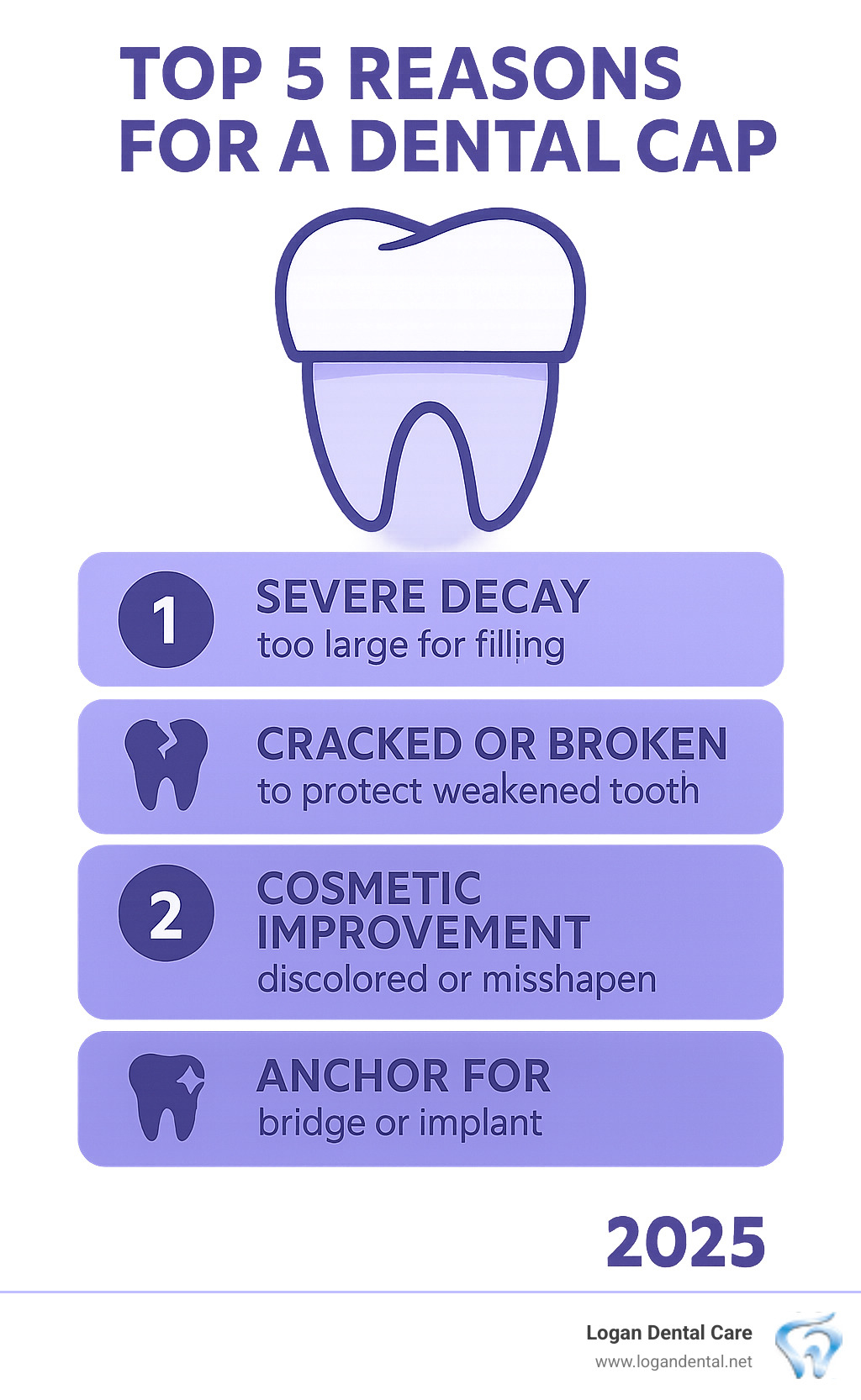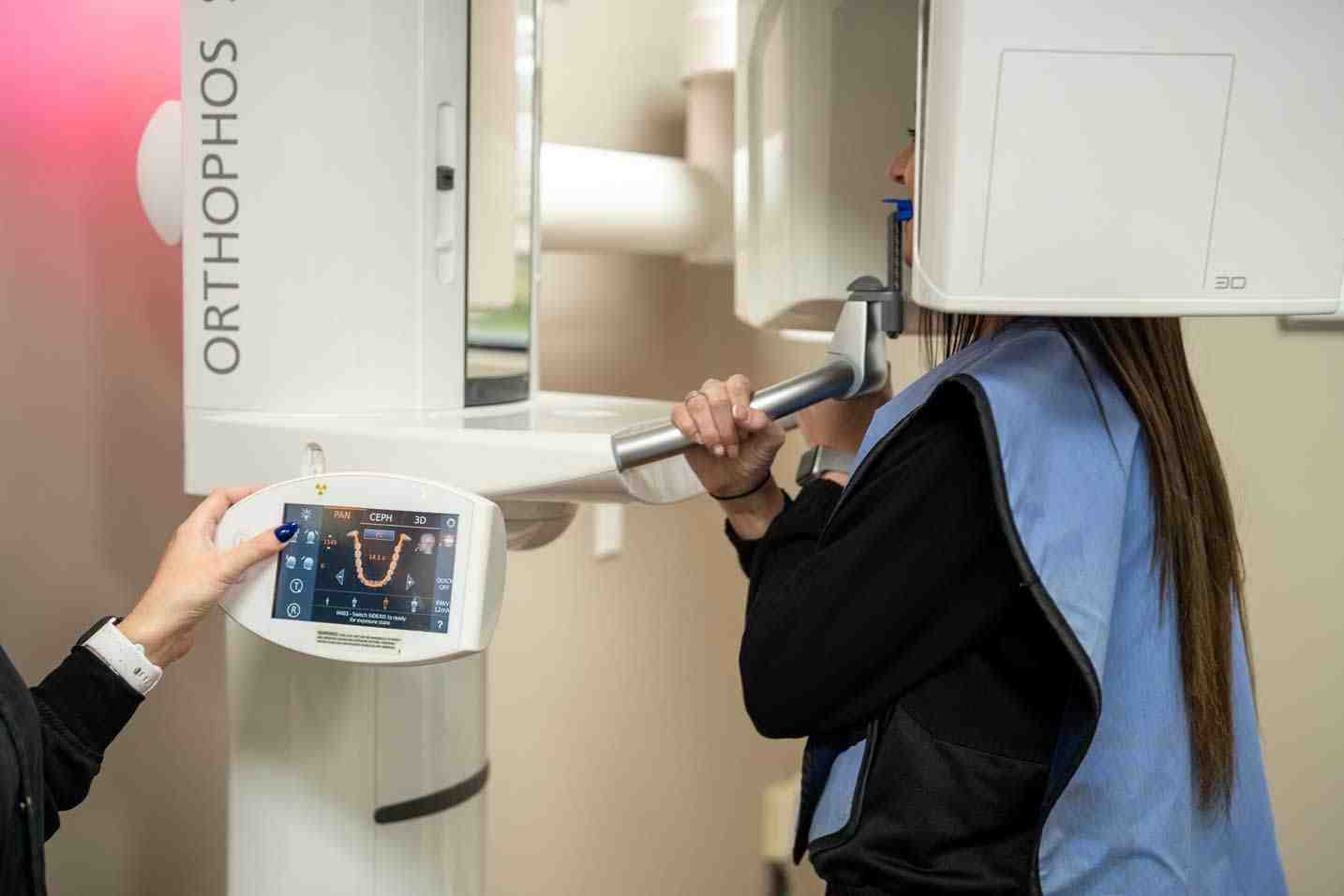Tooth Caps Uncovered – What They Are and Why You Need Them

Understanding What a Dental Cap Really Is
A dental cap is another name for a dental crown. These terms are used interchangeably to describe a protective "helmet" for a damaged tooth.
Quick Answer: What You Need to Know About Dental Caps
- Definition: A tooth-shaped cover that fits over your entire damaged tooth
- Purpose: Restores shape, size, strength, and appearance of weak or broken teeth
- Materials: Made from porcelain, ceramic, metal, or combinations of these materials
- Procedure: Usually requires 2 dental visits over 2-3 weeks
- Lifespan: Lasts 5-15 years on average with proper care
- Cost: Ranges from $800-$1,700+ depending on material and location
When a tooth has extensive damage from decay or cracks, a regular filling isn't enough. A dental cap wraps around the entire tooth like armor, providing the strength needed for everyday chewing and biting.
Modern dental caps look so natural that they blend seamlessly with your smile. Whether you need one after a root canal, to fix a broken tooth, or to improve your smile's appearance, dental caps are a reliable way to save and strengthen your natural teeth.

Your Complete Guide to the Dental Cap
Here at Logan Dental Care, we want you to feel confident in your dental decisions. This guide will walk you through everything you need to know about dental caps, from when they're needed to what the procedure involves.
When is a Tooth Cap Necessary?
We only recommend a dental cap when a tooth truly needs extra protection to stay healthy and strong. A cap is necessary when a regular filling can't provide enough support, especially when a tooth has significant structural damage.
Common reasons for a dental cap include:
- Severe Tooth Decay: When a cavity is too large for a filling, a cap protects the weakened tooth from fracturing.
- Large Fillings: Old, large fillings can leave the remaining tooth structure vulnerable. A cap provides the necessary reinforcement.
- Cracked or Broken Teeth: A cap holds a fractured tooth together, restoring its original shape and strength to prevent further damage.
- Cosmetic Improvement: Caps can dramatically improve the appearance of severely discolored or misshapen teeth that don't respond to other treatments.
- After a Root Canal: A root canal can make a tooth more brittle. A cap provides essential protection to ensure the treated tooth remains strong. More info about root canals and crowns.
- Supporting Other Restorations: Caps are the visible, tooth-like part of a dental implant and serve as anchors for dental bridges.
We'll always discuss your specific situation to determine the best course of action for your long-term oral health.
Choosing the Right Material for Your Dental Cap
Choosing the right material for your dental cap is a key step. The best choice depends on the tooth's location, its visibility, and your daily habits.
- All-Ceramic or All-Porcelain: These offer the most natural look, making them ideal for visible front teeth. They are beautiful but can be more delicate than other options. More info about our ceramic teeth caps.
- Zirconia: This material is the superhero of ceramics—incredibly strong (1200 MPa) yet still natural-looking. It's an excellent choice for both front and back teeth.
- Porcelain-Fused-to-Metal (PFM): PFM caps have a strong metal core with a porcelain exterior. They are durable for chewing but may show a dark line at the gum line over time.
- All-Metal: Gold alloys are extremely durable and gentle on opposing teeth, making them a great choice for back molars where aesthetics are less of a concern.
- All-Resin: This is a budget-friendly but less durable option, typically considered a short-term solution that needs replacement every three to five years.
Here's how different materials stack up:
| Material Type | Durability | Aesthetics | Best Location |
|---|---|---|---|
| All-Ceramic/Porcelain | Moderate | Excellent | Front |
| Zirconia | Excellent | Very Good | Front & Back |
| Porcelain-Fused-to-Metal | Good | Good | Front & Back |
| All-Metal | Excellent | Poor | Back |
| All-Resin | Fair | Good | Temporary |
We'll help you weigh the pros and cons of each material to find the perfect fit for your needs and budget.
The Step-by-Step Crowning Procedure
Getting a dental cap is typically a two-visit process, but we also offer convenient same-day crowns with our advanced technology.
The Traditional Two-Visit Approach:
- First Visit: After ensuring you're comfortable, we numb the area and carefully reshape the tooth to create a foundation for the cap. We then take impressions, which are sent to a lab to create your custom crown. You'll leave with a temporary crown to protect the tooth.
- Second Visit: We remove the temporary crown and check the fit and appearance of your new permanent dental cap. Once everything is perfect, we permanently bond it in place.

Same-Day Crowns – Technology Meets Convenience:
For those who prefer a single appointment, our CAD/CAM technology allows us to create your permanent dental cap right in our office. We digitally scan your tooth, design the crown on a computer, and mill it while you wait. You'll walk out with your final restoration in just a few hours—no temporary crown needed. This combines our personal approach with cutting-edge efficiency. More info about our technology.
Whether you choose the traditional or same-day method, our goal is a dental cap that looks and feels completely natural. WebMD's overview of the dental crown procedure.
Aftercare, Costs, and Alternatives
Understanding how to care for your dental cap, what to expect for costs, and what alternatives exist will help you make informed decisions about your treatment.
Longevity, Care, and Potential Risks
With proper care, your dental cap can be a long-lasting investment in your oral health.
How Long Will Your Dental Cap Last?
Most dental caps last 5 to 15 years, but many can last 20 years or more. The lifespan depends on the material, your bite, and your oral hygiene habits. All-resin crowns have the shortest lifespan (3-5 years), while metal and zirconia are the most durable.
Taking Care of Your New Dental Cap
Caring for a dental cap is just like caring for your natural teeth:
- Brush and Floss Daily: Use a soft-bristled brush and pay special attention to the area where the cap meets the gum line to prevent plaque buildup.
- Avoid Hard or Sticky Foods: Be careful with ice, hard candies, and sticky foods that could potentially chip or dislodge your crown.
- Use a Night Guard if Needed: If you grind your teeth (bruxism), we may recommend a night guard to protect your cap and natural teeth from excessive force.
- Maintain Regular Dental Visits: Routine check-ups and cleanings allow us to monitor your dental cap and address any potential issues early. More info about our dental care tips.
What Could Go Wrong?
While dental cap procedures are highly successful, potential issues are usually minor and easily managed:
- Sensitivity: Some temporary sensitivity to hot or cold is normal and should fade within a few weeks.
- Chipped Crown: Porcelain crowns can sometimes chip. Small chips can often be repaired, while larger ones may require a replacement.
- Loose Crown: If the cement washes out and your crown feels loose or falls off, contact us immediately. We can often re-cement it.
- Other Issues: Allergic reactions are rare. You might notice minor gum irritation or a dark line at the gum line with a PFM crown if your gums recede.
We're always here to help if you have any concerns after your procedure.
Understanding the Cost of a Dental Cap
We believe in transparent pricing to help you plan for your treatment.
What You Can Expect to Pay
The cost of a dental cap typically ranges from $800 to $1,700 or more per tooth. Premium materials like gold can cost up to $2,500. The final price depends on the material chosen, your location, and the complexity of the procedure. For example, costs in communities like Bellefontaine are often different from those in larger cities. Any additional procedures, like a root canal, will also affect the total investment.
Insurance and Affordability
Most dental insurance plans provide coverage for dental caps, often around 50% after your deductible is met. Our team will help you understand your benefits, including annual maximums and waiting periods, so there are no surprises. For any remaining balance, we offer financing options and payment plans to ensure you can get the care you need without financial stress.
Reputable health sources offer more details on crown costs. More info about dental crown cost.
Alternatives and Your Next Steps
While dental caps are an excellent solution for many problems, they aren't always the only one. We might discuss other options depending on your tooth's condition.
Less Invasive Options
- Onlays or 3/4 Crowns: These restorations cover only the damaged part of a tooth, preserving more healthy tooth structure. They are a great option when the damage isn't extensive enough to require a full dental cap.
- Dental Veneers: For cosmetic concerns on front teeth, such as discoloration or minor shape issues, veneers are a fantastic choice. These thin shells cover only the front surface of the tooth. More info about veneers.
When a Tooth Can't Be Saved
If a tooth is too damaged to restore, a dental implant is often the best long-term solution. An implant replaces the tooth root, and a dental cap is placed on top to create a stable and natural-feeling new tooth. More info about dental implants.
Your Personal Consultation Matters
Choosing the right treatment requires a personal consultation. At Logan Dental Care, we take the time to listen, perform a thorough exam, and explain all your options in plain language. We combine our small-town, family-like care with the latest dental technology to provide accurate diagnoses and effective treatments for our patients in Bellefontaine and Logan County.
If you think you might need a dental cap or are experiencing dental discomfort, contact us. We're here to help you make a confident decision about your oral health.


